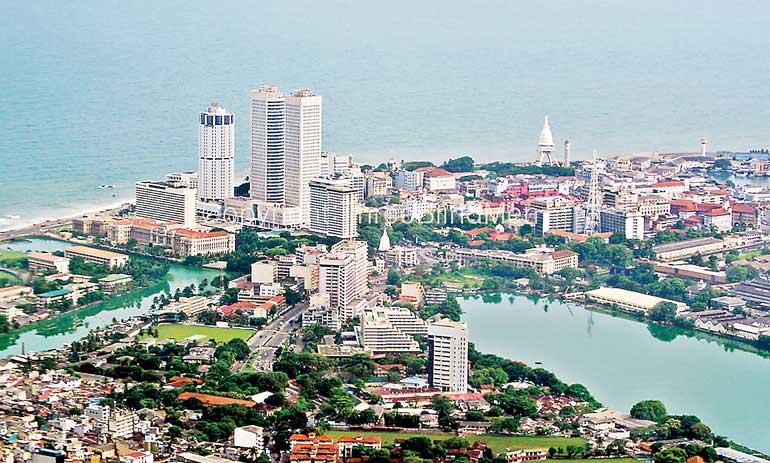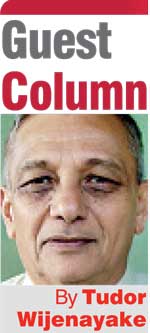Monday Mar 02, 2026
Monday Mar 02, 2026
Wednesday, 26 August 2015 00:00 - - {{hitsCtrl.values.hits}}

The public need to be guided towards honest and simple living, with the top setting an example
The recent election leading to a National Government was forecasted by the President and the resulting Government would be the best for the country. The National Government cannot be expected to fulfil promises made during the elections campaigns.
It is common knowledge that the country’s finances are in a poor state and cannot afford extravagancies. The new Government needs to control expenditure, forget promises made during the pre-election period and concentrate on the country’s development needs.
As the President has already shown by example, the public need to be guided towards honest and simple living, with the top setting an example. The new Constitution has reduced the number of ministers should result in fewer ministries and departments, along with reduced staff, offices and vehicles.
Past decades saw privileges and facilities to MPs increasing, now the hand-outs need curtailing as terrorist threats to MPs have disappeared and they would attend to needs of an electorate and not a district. Also, the authority given to politicians to appoint supporters to Government positions and admit children to schools should be withdrawn.
Right for information
As promised during the pre-election period, the information on Government agencies should be made available to the public and the most convenient form would be over the internet. The Government gazette and all Government agencies should publish details of their policies, project proposals, progress on projects as information.
The Government informed that the paddy purchase details would be available on the PMB website. Although the details are not out yet, it would be a step in the right direction.
Government service
The State service is heavily overstaffed and the maintenance cost is beyond the capability of the country. Although some staff were recruited through competitive examinations, their knowledge of English and IT are weak and communication skills are poor. The situation is same even at higher levels of administration.
To control the increased numbers, future filling of vacancies should be limited to 50% of retirees. Shortages of staff in organisations could be filled by transfer from other departments having excess staff.
Future admissions into State service should be for those attaining required levels in English and IT, suited for the post. The existing staff too need be directed towards reaching required standards and those reaching the expected levels during the first two years be eligible for salary increase and every employee should be expected to attain proficiency levels within five years, failures would have their salary levels frozen.
One million jobs
The UNP in its election manifesto promised creation of one million new jobs. But the current unemployed figures are less than 4%, amounting to far less than a million. Most young spend nearly eight years idling between school and settling to an employment. In addition, large numbers of employable men and women remain idle without accepting available jobs and the idling poor are given Samurdhi benefits.
University students’ course periods are prolonged by over a year due to time lost over agitations and the majority of graduates are unsuitable for available jobs. The new Government needs to address the above situations.
Skills gap and employment
Large numbers of vacancies exist for low skilled jobs in small establishments with few takers. Bigger establishments demand skilled workers and most applicants do not possess the required skills. Technological industries are few in the country due to shortage of technically skilled persons. Most skilled workers face shortage of assistants who could learn the trade.
To correct the situation, the sick, feeble and disabled be given a living allowance, and childcare centres need to be established at village level to free mothers to accept employment. Samurdhi recipients need to be guided towards employment available in the locality.
Samurdhi officers could coordinate available jobs and the seekers. With the widespread usage of mobile phones, coordination would not be difficult. With training in skills the poor could qualify for better employment. Those refusing to accept available jobs and decline to be trained need to be downgraded in Samurdhi payments.
English in education
Sri Lanka occupied a high economic level at independence, but has been overtaken by other countries in Asia, mostly due to change of language of education from English to Sinhala/Tamil. The conversion led to division among communities and 30 years of war. Meanwhile, countries as Singapore and India with English based education improved by leaps and bounds.
The JVP’s election manifesto promised availing of education option in Sinhala, Tamil and English. An immediate policy decision needs to be taken to introduce English medium stream in all schools, the extent to be finalised based on training of teachers. In recruiting, all new teachers need to be capable in teaching in English medium.
The level of English among graduates even those who followed English medium courses is poor, due to poor knowledge prior to admission to the university and the insufficient attention paid to English skills in the universities.
The introduction and enhancement of English medium teaching in the universities, technical colleges and schools is hampered by the poor English knowledge among lecturers and teachers. Enhancing their capability would be impossible without trainers to train the existing lecturers. As such, training of trainers for enhancing capability of teaching in English medium is most urgent and help for the implementation need be requested from British Council and India.
Training of technological staff
Vocational and technical institutions have been established and a technology stream has been introduced to schools. But the quality of lecturers and instructors are pathetic and a system of training and enhancing their capabilities does not exist. A training institute for such staff need to be established with foreign assistance.
Education reforms
According to the Daily FT, on a directive from the Prime Minister, the National Human Resources Development Council under the Ministry of Policy Planning has appointed a committee of university professors to look into future needs of the entire education system and have prepared a basic policy framework for discussion. It is hoped the proposed policy would be made available to public over the internet.
Let users pay for services
The electricity usage in the country is highest between 7 and 10 p.m., when offices and factories are closed, due to people watching TV. To correct the anomaly, subsidies in electricity tariffs should be reduced to discourage TV and allow children to study.
Motorists demand better roads and highways, but the annual vehicle license fee does not reach half a tank of petrol. Hence, license fees on cars, motor cycles and three wheelers need to be increased by many fold.
The public demand removal of garbage and improved facilities, but assessed rates payable to local authorities for housing is a pittance. Charges on vacant lands do not cover the cost of paper and the officer’s time.
Agriculture
Enhanced purchase price of paddy can be maintained, but part of the fertiliser subsidy be replaced with compost, lower chemical fertiliser use would reduce kidney disease and make use of rotting garbage on the wayside.
Farmers need to be encouraged and trained to cultivate on time taking advantage of weather and save water. They need be encouraged to produce quality products and satisfy customers while getting higher prices. Researchers should be directed to produce higher quality crops and fruits, and find solutions to diseases affecting crops.
Transport
To encourage public transport, progressive higher taxes be imposed on vehicles over 1000cc and the issue of duty-free permits need be drastically curtailed, and limited to 2000cc. Subsidised railway travel to Government staff be limited to 30km and encourage them to get transfers near their homes, which would allow room for paying private passengers.
The country’s one million three wheelers are a menace to other vehicles and their charges are excessively high. Their taxes and annual licensing fees need to be raised.
As proposed by the Japanese, elevated electric trains (metro) need to be introduced to high density routes and introduce rapid bus transport, a comfortable bus service as proposed in the report for the Ministry of Transport. In the proposed megalopolis, outer and inner necklaces need to be developed to eight lane roads, allowing two lanes for rapid bus transport, three wheelers and motor cycles.
Housing
Colombo Fort’s surroundings are witnessing large development projects including hotels, offices and apartment complexes, and more will follow. These developments create employment opportunities for hotel staff, shop attendants and maintenance staff who are expected to start early and work late hours.
The urban poor lived in shanties and in railway reservations and relocated to multi-storeyed housing would be best suited to fill these positions. They need be trained in required skills to fill available employment opportunities and will result financially strong residents with the ability to pay for rents and services. As such, relocation of slum dwellers to high rise residences needs to continue, transform Colombo to a beautiful city and offer the poor a better life.
The country’s houses are becoming larger while family numbers dwindle; large houses need to be discouraged with progressive higher annual taxes for houses over 1,500sq.ft. Multi-storeyed housing needs to be encouraged where public transport as railway stations, metro and rapid-bus transport is conveniently available. Occupants of Government housing should be made to pay a rent based on location, floor area and maintenance costs. Occupiers with rent arrears be allowed a period to settle or be expelled.
Development projects
Most development projects during the past few decades were either politically motivated or were hijacked by the politicians. The Expressway to Kandy in the currently proposed form is over 20km longer than the A1 route and would be an expensive failure. To avoid repeat of mistakes, all highway proposals need be presented for public scrutiny, and subjected to public discussion to ensure proper routes and the costs be reasonable.
The JVP manifesto proposed all roads to be improved to two lanes with pedestrian walkways. The proposed road would require a 40-foot wide corridor. Initially, all bus routes be developed in a 20-year program. Meanwhile, street lines could be marked, preventing further development into the corridor.
Under the currently proposed projects, the megalopolis could be amended to include the Port City (which is expected to generate 80,000 jobs), reassess water distribution criteria from Moragahakanda/Kaluganga project and implement the ‘River for Jaffna’ proposals.
According to current proposals, only a small percentage of Moragahakanda water will reach Iranamadu tank in Kilinochchi and that too only after 2030. If a reasonable quantity of water is issued, the northern farmers will supply the country’s requirement of potato and onions and the prices would come down.
Environment
All garbage can be converted into compost and be issued to farmers as part of the fertiliser subsidy. In Colombo and Gampaha Districts, compost could be used to cultivate abandoned paddy fields with rice, vegetables or grass. The cultivated grass used as fodder to rear cattle would offer fresh milk to consumers making the country self-sufficient in milk.
Degraded forest lands could be re-cultivated with indigenous timber varieties and plants consumed by the elephants. Reduce the human-elephant conflict by relocating human settlements on elephant corridors. Release grazing lands beyond water’s edge in irrigation tanks back to elephants to reduce elephants invading gardens.
Eliminate fast-spreading invasive plant spices as giant mimosa, ipil-ipil, spiny bamboo or bambusa bambos (in Minneriya), wel-aatha or annona glabra, diya-para or dillenia triquetra, which have invaded into reservations, uncultivated lands and are spreading fast.